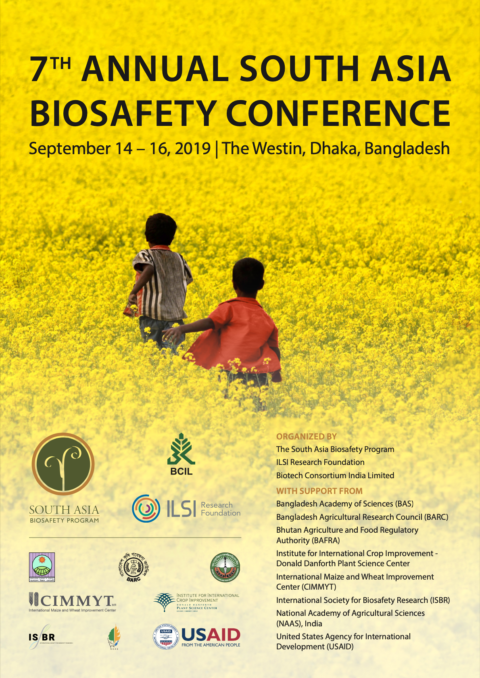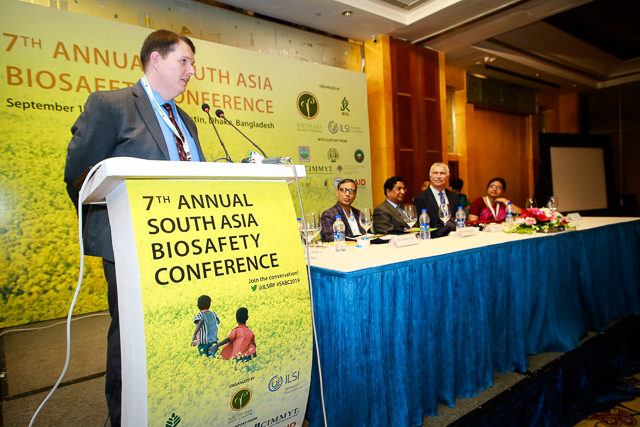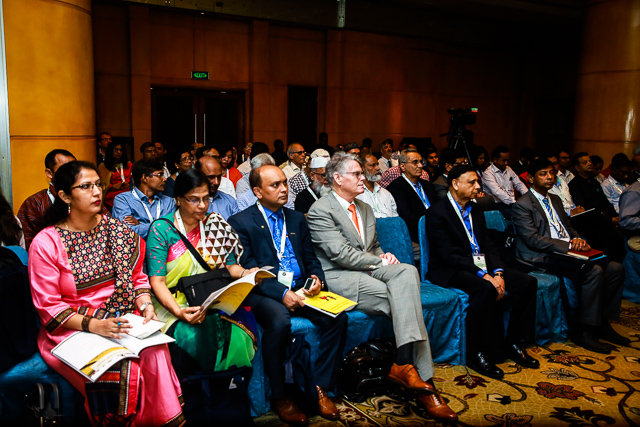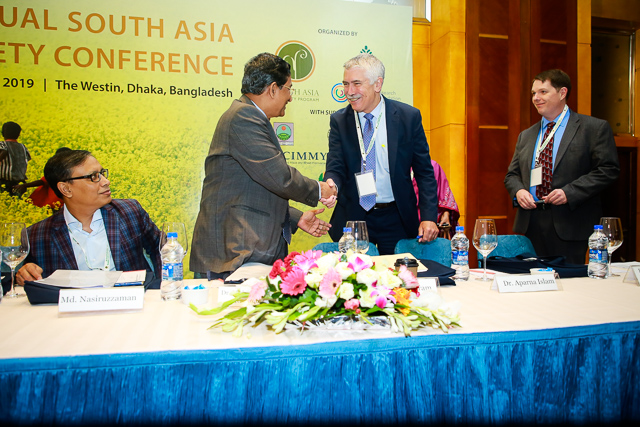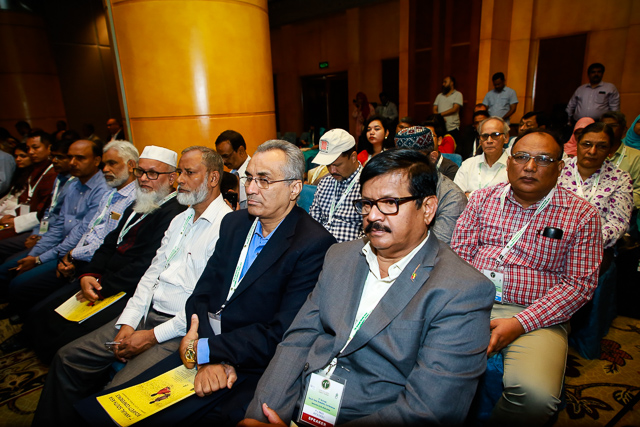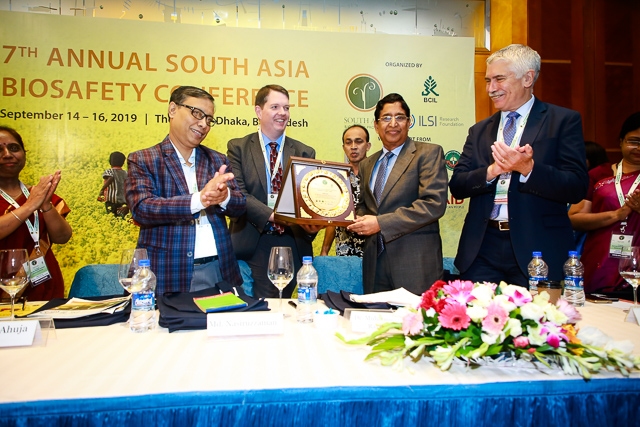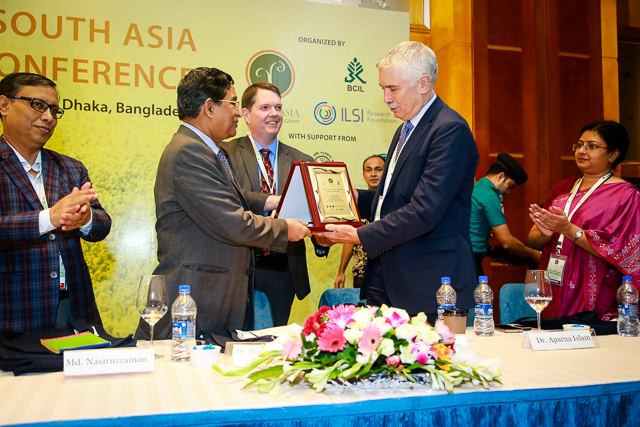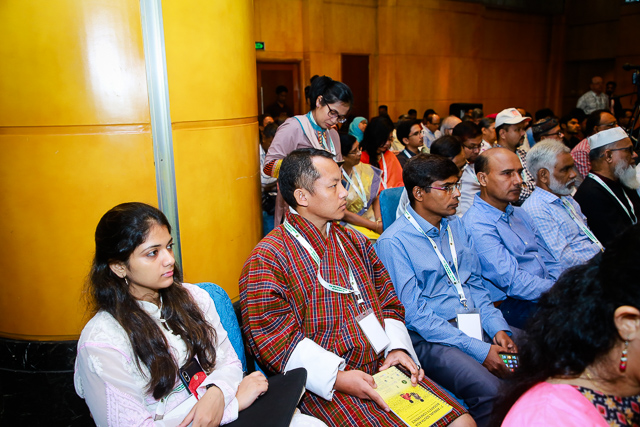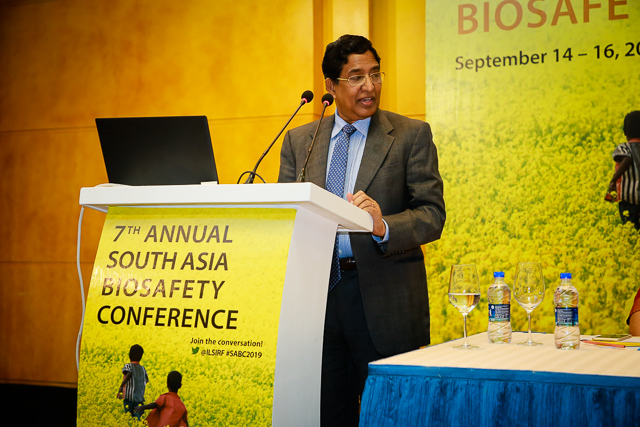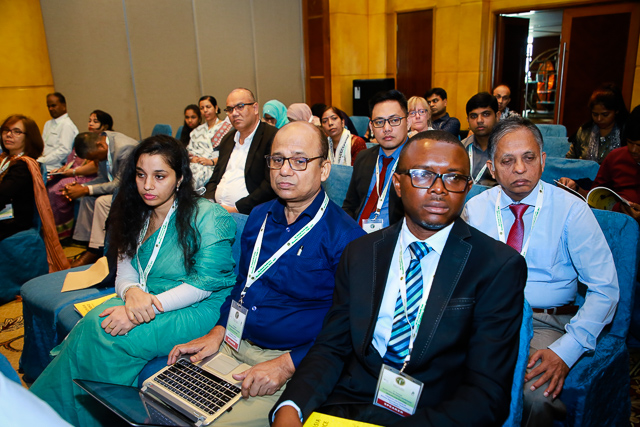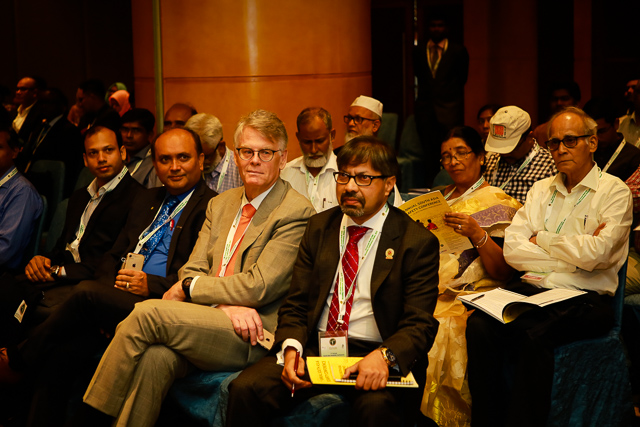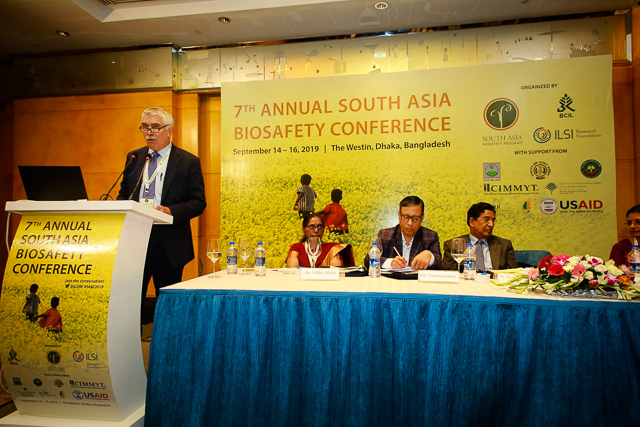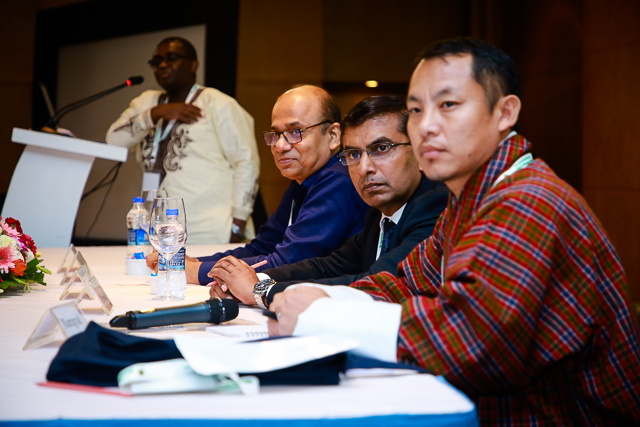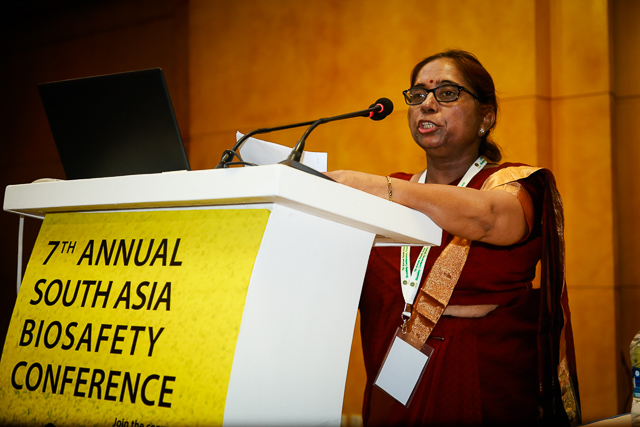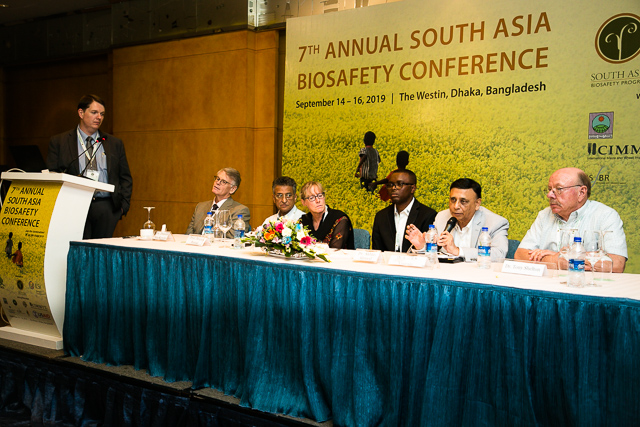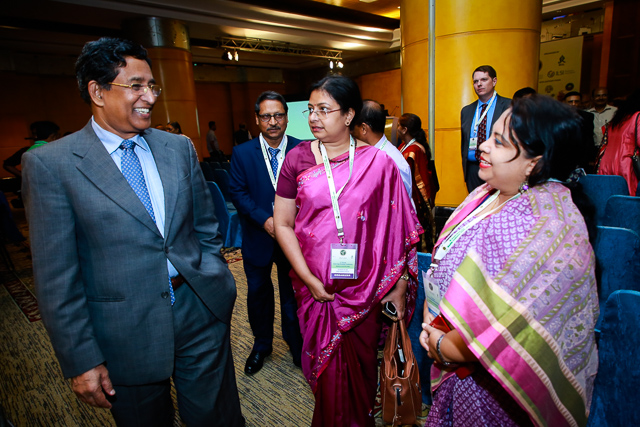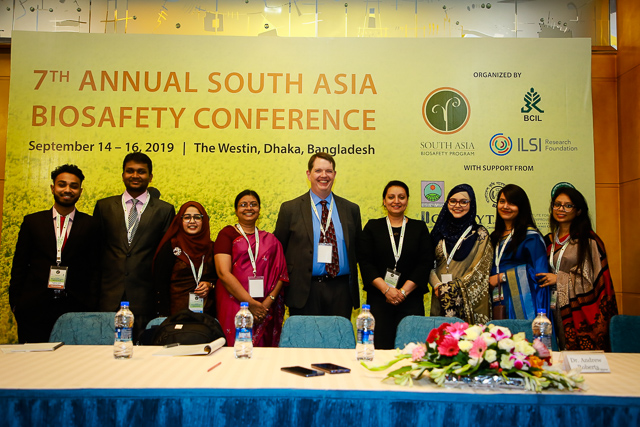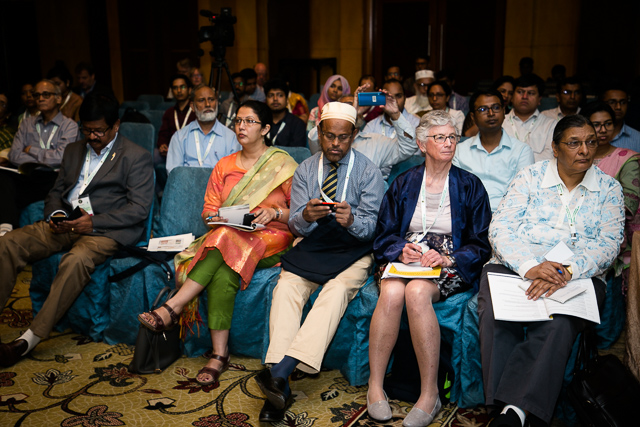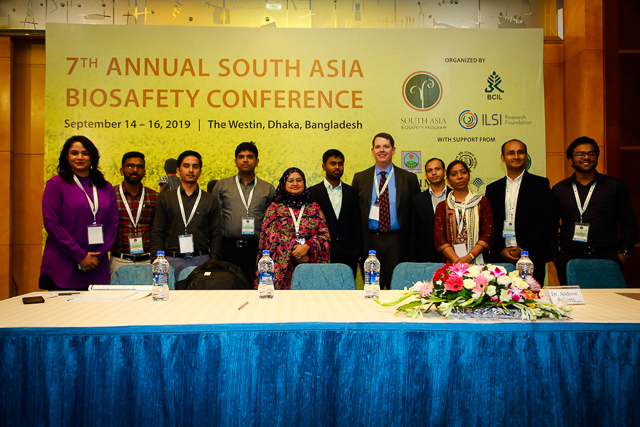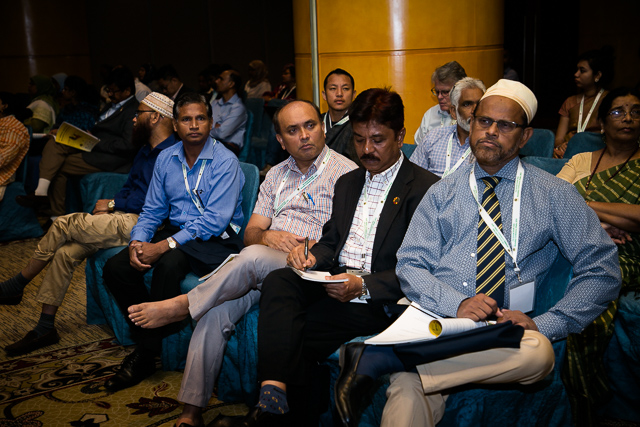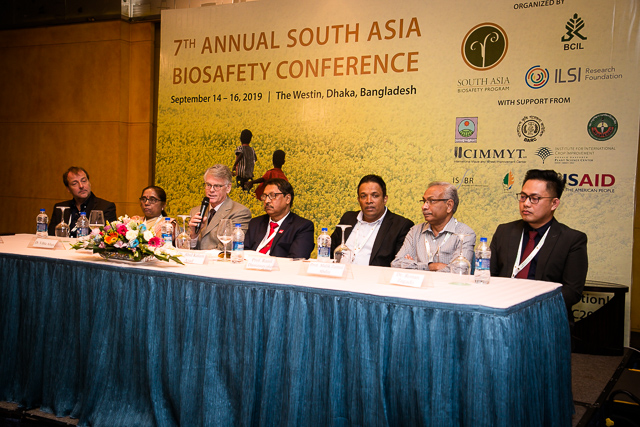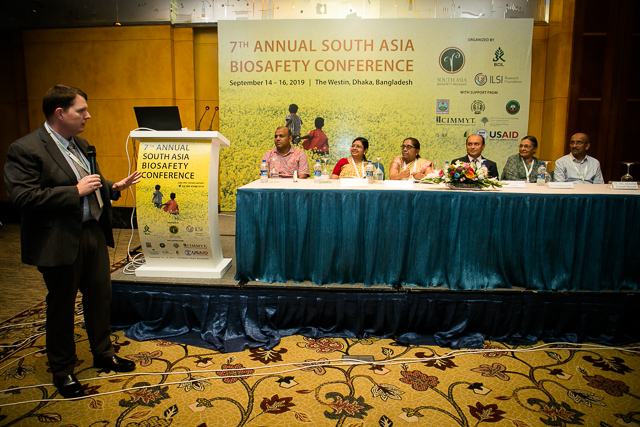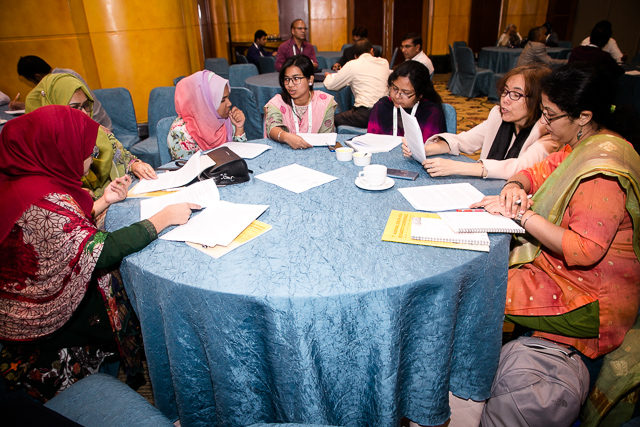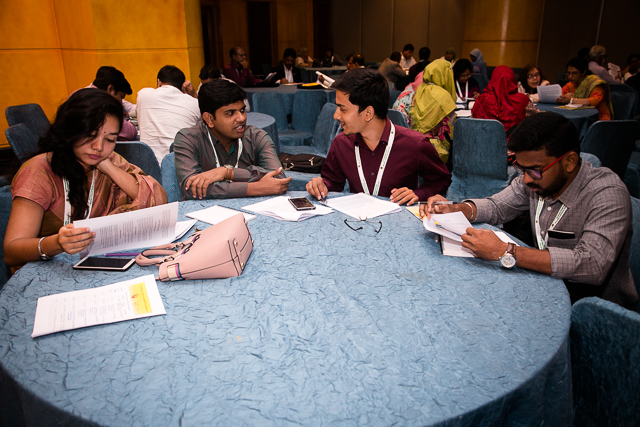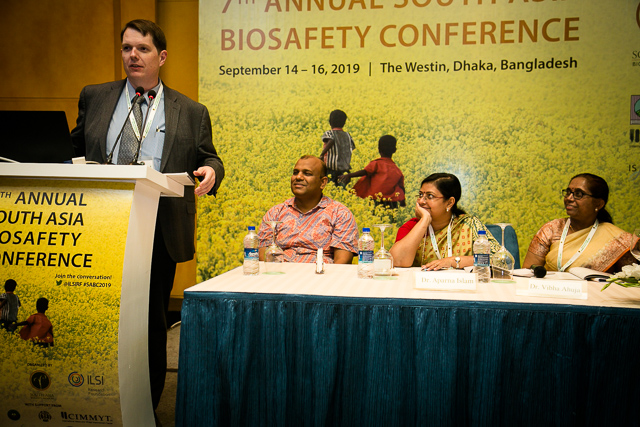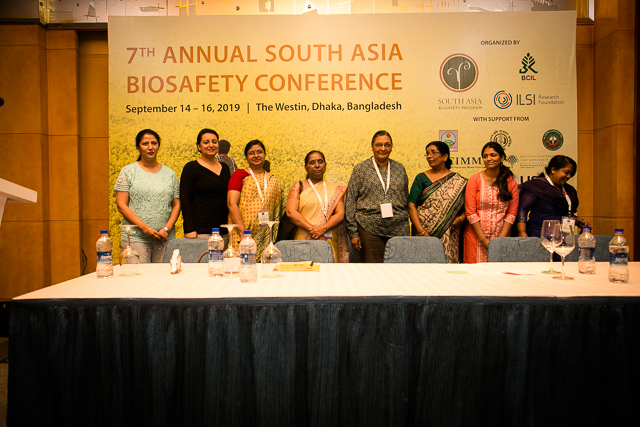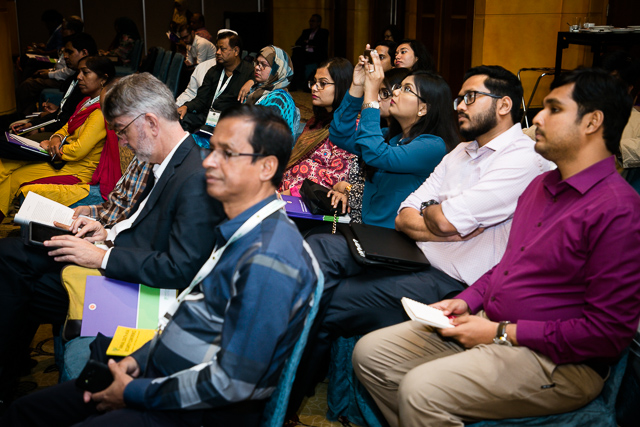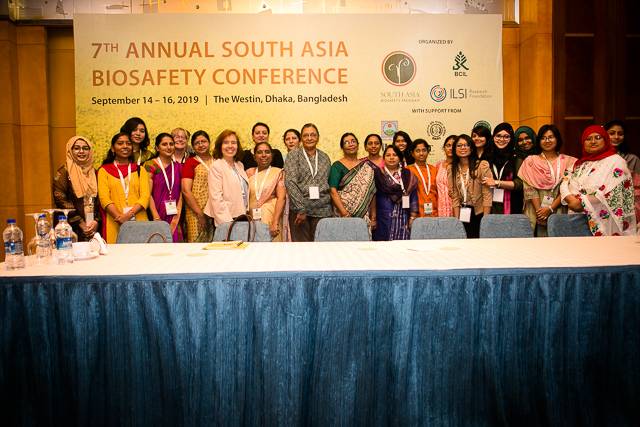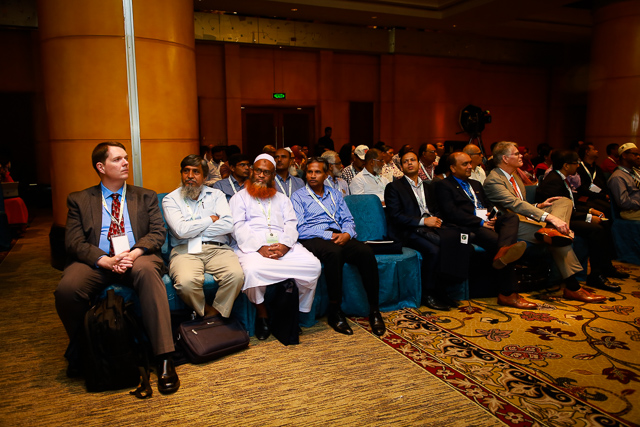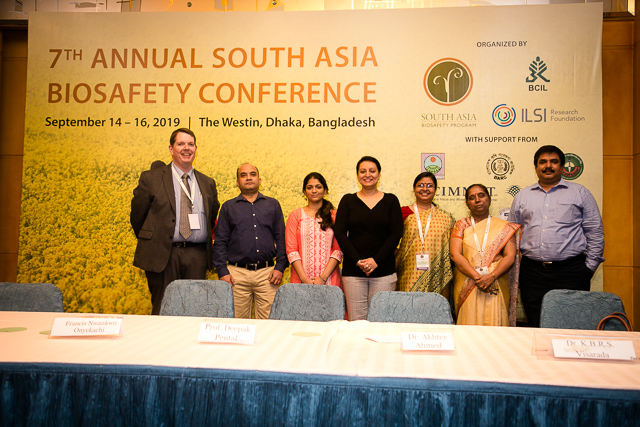7th Annual South Asia Biosafety Conference (SABC2019)
-
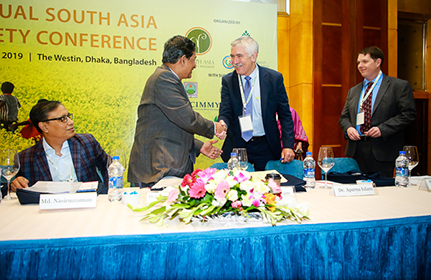
September 14, 2019-September 16, 2019
The Westin
Dhaka, Bangladesh
Under the auspices of the South Asia Biosafety Program, the Agriculture & Food Systems Institute and Biotech Consortium India Limited organized the 7th Annual South Asia Biosafety Conference on September 14-16, 2019 in Dhaka, Bangladesh. This annual conference is the premier biosafety meeting in South Asia and provides an essential forum to hear from leading scientists representing regulatory agencies, public sector research institutions, and the private sector in South Asia and internationally.
Media Coverage
Below is a selection of media coverage related to the 7th Annual South Asia Biosafety Conference:
“Bangladesh committed to ensuring bio-safety: Razzaque.” Daily Bangladesh Post, September 14, 2019. https://www.bangladeshpost.net/posts/bangladesh-committed-to-ensuring-bio-safety-razzaque-11949 (accessed September 18, 2019)
“Dhaka committed to ensure bio-safety: Minister.” Green Watch, September 14, 2019. https://greenwatchbd.com/dhaka-committed-to-ensure-bio-safety-minister/ (accessed September 18, 2019).
“The Government is Working to Control ‘Army Worm’: Minister of Agriculture” (translated). Barta24, September 14, 2019. http://bit.ly/2lVcgGQ (accessed September 18, 2019).
“7th Annual Conference on South-Asia Bio-safety.” The Daily Sun, September 14, 2019. https://daily-sun.com/post/423488/2019/09/15/7th-annual-conference-on-SouthAsia-Biosafety (accessed September 18, 2019)
“7th Annual South Asia Biosafety Conference Begins at Dhaka.” Agrinews24, Setpember 14, 2019. http://www.agrinews24.com/7th-annual-south-asia-biosafety-conference-begins-at-dhaka/ (accessed September 14, 2019).
“7th Annual South Asia Biosafety Conference Begins in Dhaka.” Agricare24, September 14, 2019. https://agricare24.com/7th-annual-south-asia/ (English) http://bit.ly/2kHHlxx (Bangla) (accessed September 18, 2019).
“Agriculture Minister Dr Abdur Razzaque speaking at the inaugural function of ‘7th Annual South Asia Biosafety Conference’ at a city hotel on Saturday.” The News Today, September 15, 2019. http://www.newstoday.com.bd/?option=details&news_id=2542282&date=2019-09-15 (accessed September 18, 2019).
“‘BD committed to ensure bio-safety.’” The New Nation, September 17, 2019. http://m.thedailynewnation.com/news/229263/bd-committed-to-ensure-bio-safety (accessed September 18, 2019).
“B’desh committed to ensuring bio-safety, says Razzaque.” The Financial Express, September 15, 2019. https://today.thefinancialexpress.com.bd/metro-news/bdesh-committed-to-ensuring-bio-safety-says-razzaque-1568476727 (accessed September 18, 2019)
“‘Committed to ensuring biosafety,’ Says agriculture minister.” The Daily Star, September 15, 2019. https://www.thedailystar.net/city/news/were-committed-ensure-biosafety-1800073 (accessed September 18, 2019).
Poster Program
Presenting a poster at the South Asia Biosafety Conference was a noteworthy way to share expertise or accomplishment, and poster presenters had a dedicated time to present and discuss their work with the diverse group of attendees. All posters conveyed relevance to biosafety research, environmental or food safety assessment of genetically modified organisms (GMOs), or the regulation of GM plants, animals, arthropods, or micro-organisms.
Prize Winners
- Dr. Mohammad Mostofa placed first in the Poster Competition with the presentation Strigolactones Positively Regulate Defense Mechanisms to Enhance Resistance Against Sheath Blight of Rice (Oryza sativa), receiving a cash award of USD $300 and a one-year membership to the International Society for Biosafety Research.
- Dr. Dipali Gupta placed second in the Poster Competition with the presentation Biocontrol of Wheat Blast Disease by Plant Probiotic Bacilli, receiving a cash award of USD $200 and a one-year membership to the International Society for Biosafety Research.
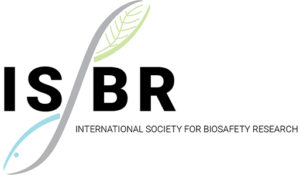
Lightning Round for Students and Early Career Researchers
The Lightning Round was a unique opportunity for students and early career researchers to share their research in an oral presentation format that is exciting, challenging, and entertaining. All presentations had to convey relevance to biosafety research, environmental or food safety assessment of genetically modified organisms (GMOs), or the regulation of GM plants, animals, arthropods, or micro-organisms. Each participant was given 5 minutes and 5 slides to clearly present their work, challenging them to think carefully about how best to use the allotted time and visual aids. The presentations were scored by the session’s Chair and Co-Chair, and prizes were awarded to the top two participants.
Prize Winners
- Mr. Abdullah Al Noman placed first in the Lightning Round for Students and Early Career Researchers with the presentation Morphological and Molecular Diversity Among the Pyricularia oryzae Cavara Isolates Causing Wheat Blast in Bangladesh, receiving a cash award of USD $300.
- Mr. Mohammad Umer Sharif Shohan placed second in the Lightning Round for Students and Early Career Researchers with the presentation Are Root Characteristics/Architectural Traits of Rice Plants a Better Indicator of Salt Tolerance, receiving a cash award of USD $200 and a one-year membership to the International Society for Biosafety Research.

Agenda
Inaugural Session
Saturday, September 14, 2019
Welcome Address
Dr. Vibha Ahuja
Chief General Manager, Biotech Consortium India Limited and Senior Advisor, South Asia Biosafety Program, India
14 Years of the South Asia Biosafety Program
Dr. Aparna Islam
Country Manager, South Asia Biosafety Program, Bangladesh
Remarks by Guest of Honor
Dr. Rob Bertram
Chief Scientist, Bureau for Food Security, United States Agency for International Development (USAID), United States
Remarks by Special Guest
Mr. Md. Nasiruzzaman
Respected Secretary, Ministry of Agriculture, Government of People’s Republic of Bangladesh
Remarks by the Chief Guest
Dr. Muhammad Abdur Razzaque MP
Honorable Minister, Ministry of Agriculture, Government of People’s Republic of Bangladesh
Vote of Thanks
Dr. Andrew Roberts
Deputy Executive Director, Agriculture & Food Systems Institute, United States
Plenary Session I: Biosafety Regulation in South Asia
Saturday, September 14, 2019
Biotechnology is a highly dynamic field. Novel techniques and products are continuously being developed and regulatory systems mandated to address health and environmental safety must respond accordingly. Plenary Session I will focus on the status of biosafety regulatory frameworks and policies in Bangladesh, Bhutan, India, Pakistan and Sri Lanka. The session also features a talk from Dr. Rufus Ebegba, Director General of National Biosafety Management Agency, Nigeria about how the NBMA approached its recent approval of insect-resistant cowpea, a critically important food security crop in that country.
Chair: Dr. A.K.M. Rafique Ahammed, Department of Environment, Bangladesh
Co-chair: Mr. Alex Owusu-Biney, United Nations Environment Programme, Kenya
Introduction
Update on Biosafety Regulation in Bangladesh
Mr. Mohammed Solaiman Haider
Department of Environment, Bangladesh
Biosafety Regulation in Bhutan
Mr. Namgyal
Bhutan Agriculture and Food Regulatory Authority, Bhutan
Current Status of GE Plant Risk Assessment and Regulation in India
Mr. Tarun Kathula
Ministry of Environment, Forest and Climate Change, India
Present Status of Biosafety Regulations in Sri Lanka
Dr. D.M.J.B. Senanayake
Ministry of Mahaweli Development and Environment, Sri Lanka
Guest Country: Nigerian Biosafety Regulatory System and Its Approach to Risk Assessment and Decision Making
Dr. Rufus Ebegba Eseoghene
National Biosafety Management Agency, Nigeria
Session Q&A
Plenary Session II: Building a Community of Biosafety Practitioners
Saturday, September 14, 2019
The Biosafety Research in Bangladesh Grants Program (BRBGP) is a new competitive grants program funded by USAID and implemented under the South Asia Biosafety Program. The BRBGP is designed to help support the development of a biosafety research community of practice in Bangladesh and promote inter-institutional collaboration and partnerships. This session will include a keynote address by Dr. Rob Bertram, Chief Scientist for USAID’s Bureau for Food Security, about the importance of fostering agricultural innovation to help promote food and nutrition security, as well as presentations by the inaugural cohort of BRBGP grantees.
Chair: Dr. Md. Kabir Ikramul Haque, Bangladesh Agricultural Research Council, Bangladesh
Co-Chair: Prof. Dr. Yearul Kabir, Bangladesh Academy of Sciences, Bangladesh
Introduction
Keynote Presentation: Fostering Agricultural Innovation in Bangladesh
Dr. Rob Bertram
United States Agency for International Development (USAID), United States
Introduction to SABP’s Biosafety Research in Bangladesh Grants Program
Dr. Andrew Roberts
ILSI Research Foundation, United States
Vegetable Pest Management Practices in Bangladesh and Their Impacts on the Environment
Prof. Dr. Md. Shahidul Haque
Bangladesh Agricultural University, Bangladesh
Assessment of Weed Management Practices in Rice Cultivation in Bangladesh
Dr. Abdun Noor Muhammad Iftekhar Alam
National Institute of Biotechnology, Bangladesh
Use and Handling Practices of Pesticides Used in the Cultivation of High Yielding Potato Varieties in Bangladesh
Dr. Mohammad Zabed Hossain
University of Dhaka, Bangladesh
Session Q&A
Lightning Round for Students and Early Career Researchers
Saturday, September 14, 2019
Chair: Dr. Andrew Roberts, Agriculture & Food Systems Institute, United States
Introduction
A Preliminary Survey on Sri Lankans’ Knowledge and Understanding of Biosafety and GMOs
Ms. Mihiri Kandanaarachchi
Food and Agriculture Organization of the United Nations, Sri Lanka
DNA Barcoding and Characterization of Non-Edible Oil Feedstock with Potential for Biodiesel Production in Bangladesh
Ms. Farhana Haque Nimme
University of Sciences and Technology, Bangladesh
Strigolactones Positively Regulate Defense Mechanisms to Enhance Resistance Against Sheath Blight of Rice (Oryza sativa)
Dr. Mohammad Mostofa
Bangabandhu Sheikh Mujibur Rahman Agricultural University, Banlgadesh
Metagenomics and Phylogenetic Studies for Identification of Enterococcus spp. Causing Streptococcosis in Tilapia (Oreochromis niloticus)
Ms. Tasmina Akter
Bangabandhu Sheikh Mujibur Rahman Agricultural University, Bangladesh
In vitro Regeneration and Agrobacterium-mediated Genetic Transformation of Local Varieties of Mungbean (Vigna radiata (L). Wilczek)
Mr. Sujay Bhajan
University of Dhaka, Bangladesh
Genetic Transformation Aimed at Overexpressing Glyoxalase III has Enhanced Salinity Stress Tolerance in Sugarcane
Mr. V.M. Manoj
ICAR-Sugarcane Breeding Institute, India
Are Root Characteristics/Architectural Traits of Rice Plants a Better Indicator of Salt Tolerance?
Mr. Mohammad Umer Sharif Shohan
University of Dhaka, Bangladesh
Towards Development of β-ODAP-free Grasspea (Lathyrus sativus L.)
Dr. Neetu Singh
ICAR-Indian Institute of Pulses Research, India
Spatio-temporal Expression of Cry1Ac Protein in Bt Eggplant Varieties and Susceptibility of Brinjal Fruit and Shoot Borer to Cry1Ac Protein
Mr. Saiful Islam
Bangladesh Agricultural Research Institute, Bangladesh
Success of Wide Hybridization on the Genetic Improvement of Indica Rice
Dr. Md. Nashir Uddin
North South University, Bangladesh
Morphological and Molecular Diversity Among the Pyricularia oryzae Cavara Isolates Causing Wheat Blast in Bangladesh
Mr. Abdullah Al Noman
University of Dhaka, Bangladesh
Poster Session
Saturday, September 14, 2019
Poster Competition
All posters accepted into the Poster Program were eligible for the Poster Competition. In cases where a registrant had two or more posters accepted for the Poster Program, s/he was asked to identify which one should be included in the poster competition, i.e., only one poster per registrant was eligible for the Poster Competition. The posters were judged on September 14-15, and the winners were announced on September 16, during the conference’s Closing Session.
Evaluation and Judging
The criteria for evaluating the posters during SABC 2019 were as follows:
Abstract (10%) – Clarity and correlation with poster.
Scientific Content (70%) – Introduction and background with literature cited, objectives, materials and methods, results and discussion, and significance to the field. The quality of the research presented was judged on its scientific rigor and significance as conveyed by the poster. Each poster needed to have been self-explanatory. Judges had the opportunity to discuss posters with the presenters, but this was not considered in the evaluation of the display.
Poster Display (20%) – Posters were judged on organization, effective use of space, legibility, grammar and spelling, and effective use of graphics.
Each poster display was judged independently by three judges on September 14-15, 2019 based on the abstract, scientific content, and poster display. Judges were encouraged to provide constructive comments for each poster. However, comments may have been very brief or absent because of the limited time available. Winners were announced on September 16.
Layout and Design
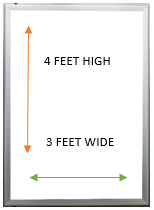 The maximum dimensions for the poster was 48 inches/122 cm (height) x 36 inches/91 cm (width). Poster boards were a plywood surface that permitted the use of removable double-sided tape, tacks, or board pins.
The maximum dimensions for the poster was 48 inches/122 cm (height) x 36 inches/91 cm (width). Poster boards were a plywood surface that permitted the use of removable double-sided tape, tacks, or board pins.
The following suggestions were made by conference organizers with the aim of ensuring the readability and quality of posters:
- Check for proper spelling and grammar.
- Use a standard typeface font.
- Ensure text is clear and concise.
- Important information should be readable from about 10 feet away.
- Use bullets, numbering, and headlines to make it easy to read.
- Include tables, figures, graphs, and color to enforce key points.
- Standard abbreviations may be used without definition, but nonstandard abbreviations/acronyms should be placed in parentheses after the first use of the terminology. It is important to keep nonstandard abbreviations/acronyms to a minimum, to allow for readability and understanding.
- Have a consistent and clean layout.
- Include any appropriate acknowledgments, your name, and institutional affiliation.
Assigned Spaces
Each accepted poster was assigned a numbered space for where they should be posted in the conference hall. Posters were added to their assigned space on Saturday, September 14, 2019 prior to the beginning of the Poster Program. Posters remained in their assigned space until Monday, September 16, 2019, after the closing session, to ensure that attendees and judges had adequate time to view the posters.
Plenary Session III: Rationalizing Risk Assessment and Regulation of Low Risk Activities
Sunday, September 15, 2019
This session will address the concept of proportionality in risk assessment and how approaches to the regulation of products of modern biotechnology might benefit from a re-examination, particularly given some of the newer techniques and products. Presentations will explore examples of genetically modified organisms that might be characterized as low-risk because of genotypic or phenotypic characteristics, or management and production practices that have a mitigating impact on potential risks to human health or the environment.
Chair: Dr. Janet Gorst, Food Standards Australia New Zealand, Australia (retired)
Co-chair: Dr. Lalitha Gowda, Central Food Technological Research Institute, India (retired)
Introduction
Keynote Presentation: Understanding the Concept of Proportionality – Low Risk Activities and the Future of Biosafety Regulation
Dr. Andrew Roberts
Agriculture & Food Systems Institute, United States
Gene-edited Crops – Need for Rationalized and Proportionate Risk Assessment and Regulation
Dr. Ramaiah Valasubramanian
Corteva Agriscience, India
Efficient Resistance to BmNPV Infection by Transgenic Silkworm (Bombyx mori), as Demonstrated by Multilocational Contained Trials
Dr. P.J. Raju
Andhra Pradesh State Sericulture Research and Development Institute, India
Biosafety Analysis of GE Crops – Our Experience with Mustard
Prof. Deepak Pental
University of Delhi, South Campus, India
Session Q&A
Plenary Session IV: Biotechnology Research and Development in South Asia
Sunday, September 15, 2019
Innovations in agricultural research are essential to meet the challenges of sustainably producing food, feed, and fiber for a growing global population under conditions of increasing resource constraints and changing climate. Biotechnology provides a suite of tools that are being applied to develop plants and animals with a range of traits designed to improve productivity, quality, and resiliency. This session includes talks by scientists who are applying genetic engineering to address important biotic and abiotic challenges faced by South Asian farmers and producers.
Chair: Dr. Zeba Seraj, University of Dhaka, Bangladesh
Co-chair: Prof. Ranil Dassanayake, University of Colombo, Sri Lanka
Introduction
Development of a Novel Salt-Tolerant Transgenic Indica Rice Plant through Manipulation of the Inositol Metabolic Pathway
Prof. Arunendra Nath Lahiri Mazumder
Bose Institute, India
Transforming a Local Rice Variety using HVA-1 Promoter to Demonstrate Over-Expression of OsDREB2A Gene under Drought and Salinity Stress: A Laboratory Experience in Accommodating Transgenic Research in Sri Lanka
Ms. Vajirapani DeSilva
GENETECH Molecular Diagnostics, Sri Lanka
Improvement of Grain Legumes through Biotechnology
Dr. Rakha Hari Sarker
University of Dhaka, Bangladesh
Colocasia esculenta Tuber Agglutinin, a Newly Characterised Non-allergenic Protein Provides Resistance to Indian Mustard Against Most Devastating Sucking Insect, Mustard Aphid
Prof. Sampa Das
Bose Institute, India
Okra Cultivation in Bangladesh: Major Challenges and Opportunities
Dr. Md. Anowar Hossain
University of Rajshahi, Bangladesh
Session Q&A
Parallel Workshops
Sunday, September 15, 2019
Workshop I: Managing Fall Army Worm in South Asia
Dr. Timothy J. Krupnik and Dr. Dan McGrath
International Maize and Wheat Improvement Center (CIMMYT), Bangladesh
Workshop II: Gene Editing and Regulation
Dr. Andrew Roberts and Dr. Bhavneet Bajaj
Agriculture & Food Systems Institute, USA
Workshop III: GE Food Safety Assessment – Mutual Acceptance of Data
Dr. Vibha Ahuja
Biotech Consortium India Limited, India
Dr. Lalitha Gowda
CSIR-Central Food Technological Research Institute, India (retired)
Plenary Session V: Planning and Permitting Field Trials for Novel Organisms
Monday, September 16, 2019
Moving from the lab to the field can be a challenge for both the scientists who develop transgenic organisms, as well as the risk assessors and regulators who must evaluate and approve these activities. This session will provide insights into the design and management of field trials of some novel insects and plants.
Chair: Dr. Abul Kalam Azad, Bangladesh Agricultural Research Institute, Bangladesh
Co-chair: Dr. Donald MacKenzie, Donald Danforth Plant Science Center, United States
Introduction
Target Malaria’s Field Entomology Preparedness for the First Releases of GM Malaria Mosquitoes in Africa
Dr. Frederic Tripet
Keele University, United Kingdom
Comparative Fitness Assessment of RNA Interference-based Transgenic Aedes aegypti Resistant to Dengue Virus Transmission in a Contained Facility in Sri Lanka
Prof. Ranil Dassanayake
University of Colombo, Sri Lanka
Achievements in Genetic Transformation of a Tree Crop and Obstacles for Field Trial: The Case of Natural Rubber (Hevea brasiliensis) from India
Dr. James Jacob
Rubber Board – Ministry of Commerce & Industry, India
Planning Field Trial of Transgenic Artemisia annua L.: A Source of a Novel Antimalarial Drug
Prof. Malik Zainul Abdin
Jamia Hamdard University, India
Social Mobilization Strategy Towards Positive Regulatory Outcome of the Golden Rice Field Trial Application in the Philippines
Dr. Ronan Zagado
Philippine Rice Research Institute (PhilRice), Philippines
Session Q&A
Plenary Session VI: Sharing Outcomes from Workshops
Monday, September 16, 2019
Chair: Dr. Vibha Ahuja, Biotech Consortium India Limited, India
Co-chair: Dr. Aparna Islam, South Asia Biosafety Program, Bangladesh
Introduction
Workshop I: Managing Fall Army Worm in South Asia
Dr. Timothy J. Krupnik
International Maize and Wheat Improvement Center (CIMMYT), Bangladesh
Workshop II: Gene Editing and Regulation
Dr. Md. Tofazzal Islam
Bangabandhu Sheikh Mujibur Rahman Agricultural University, Bangladesh
Workshop III: GE Food Safety Assessment – Mutual Acceptance of Data
Dr. Lalitha Gowda
CSIR-Central Food Technological Research Institute, India (retired)
Special Presentation: Outcomes from the SAARC Regional Expert Consultation Meeting on the Progress and Prospects of Agricultural Biotechnology and Biosafety in South Asia
Dr. Md Abdullah Yousuf Akhond
Bangladesh Agricultural Research Institute, Bangladesh
Session Q&A
Plenary Session VII: Public Sector GE Crop Development and Deployment
Monday, September 16, 2019
Public sector institutions play a significant role in advancing the research, development, and deployment of novel crops, and particularly those that are key for food and nutrition security in low- and middle-income countries. This session features presentations about public-sector developed genetically engineered crops that have been, or will soon be, released for commercial cultivation.
Chair: Prof. Deepak Pental, University of Delhi South Campus, New Delhi, India
Co-chair: Dr. Karen Hokansan, University of Minnesota, United States
Introduction
Keynote Presentation: Impacts of Bt Brinjal (Eggplant) Technology in Bangladesh
Dr. Akhter Ahmed
International Food Policy Research Institute, Bangladesh
Genetically Engineered Crop Development and Deployment in Africa: The Case of Pod Borer Resistant (PBR) Cowpea
Dr. Francis Nwankwo Onyekachi
African Agricultural Technology Foundation, Nigeria
Development of Cassava Brown Streak Disease Resistant Cassava Event 4046
Dr. Donald MacKenzie
Donald Danforth Plant Science Center, United States
Bringing Bt Eggplant to Resource-Poor Vegetable Farmers in Bangladesh and the Philippines
Dr. Tony Shelton
Cornell University, United States
Closing Session
Monday, September 16, 2019
Poster Awards
- Dr. Mohammad Mostofa placed first in the Poster Competition with the presentation Strigolactones Positively Regulate Defense Mechanisms to Enhance Resistance Against Sheath Blight of Rice (Oryza sativa), receiving a cash award of USD $300 and a one-year membership to the International Society for Biosafety Research.
- Dr. Dipali Gupta placed second in the Poster Competition with the presentation Biocontrol of Wheat Blast Disease by Plant Probiotic Bacilli, receiving a cash award of USD $200 and a one-year membership to the International Society for Biosafety Research.
Lightning Round Awards
- Mr. Abdullah Al Noman placed first in the Lightning Round for Students and Early Career Researchers with the presentation Morphological and Molecular Diversity Among the Pyricularia oryzae Cavara Isolates Causing Wheat Blast in Bangladesh, receiving a cash award of USD $300.
- Mr. Mohammad Umer Sharif Shohan placed second in the Lightning Round for Students and Early Career Researchers with the presentation Are Root Characteristics/Architectural Traits of Rice Plants a Better Indicator of Salt Tolerance, receiving a cash award of USD $200 and a one-year membership to the International Society for Biosafety Research.
Summary Remarks

